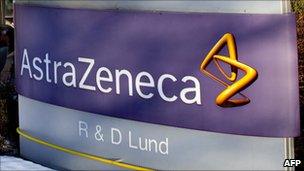AstraZeneca profits hit by tougher competition
- Published

AstraZeneca lost out on sales because it did not have a swine flu vaccine
A mixture of legal costs, competition from cheaper rivals, and the lack of swine flu drug sales have hit AstraZeneca's third-quarter profits.
Underlying pre-tax profits, which Astra said better-reflect its performance, fell 10% to $3.1bn (£1.95bn).
The firm has set aside $473m against claims that its anti-psychotic drug Seroquel has harmful side-effects.
AstraZeneca, which faces competition from generic drugs in the US, had warned that trading would be tough.
Revenues in the three months to end-September fell almost 4% to $7.9bn.
The results were just below analysts' consensus expectations, and the company's shares were down 2% in mid-morning trading.
However, the Anglo-Swedish company said that it now expected full-year profits to be at the upper end of previous estimates.
Revenues rose in all regions except the US, AstraZeneca's biggest market, where there was a 13% fall due to increased competition from generic drugs.
A year ago, the company had also benefited from swine flu vaccine sales in the US.
David Brennan, chief executive, said: "As expected, the impact of generic competition on several products and the absence of pandemic flu vaccine revenue led to a challenging quarter in the US."
Litigation
The provision for Seroquel included $203m for agreements in principle to settle more than 18,250 claims, and $270m as a reserve to cover settlement of unresolved claims.
The company faces claims that Seroquel can cause diabetes in some patients.
Despite the litigation, sales of Seroquel were up 7% in the third quarter to $1.30bn.
Sales of the cholesterol-fighting drug Crestor rose 20% to $1.37bn.
- Published30 June 2010